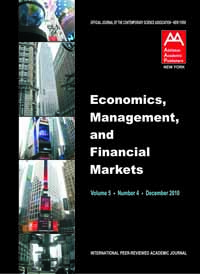TARGETED APPROACH VS. LIBERATED AND CHAOTIC FARMERS PARTICIPATION IN WATER RESOURCE MANAGEMENT
TARGETED APPROACH VS. LIBERATED AND CHAOTIC FARMERS PARTICIPATION IN WATER RESOURCE MANAGEMENT
Author(s): Nayanatara S. NayakSubject(s): Economy
Published by: Addleton Academic Publishers
Keywords: participatory irrigation management; water user societies
Summary/Abstract: This paper, based on an explorative study, throws some light on the functioning of water user groups in the management of water resources, i.e. canal irrigation, in one of the irrigation projects in Karnataka. Karnataka, like its neighbouring state of Andhra Pradesh, is in the limelight due to its massive support extended towards Participatory Irrigation Management (PIM) or Irrigation Management Transfer (IMT). The study is an empirical investigation based on a sample of 15 WUCSs located in head, middle and tail-end regions of the Malaprabha irrigation project in three blocks of Dharwad and Belgaum districts in Karnataka. The paper analyzes the role of institutions in the creation and development of users’ participation. In the light of the existing policy and legal framework an attempt is made to answer why farmers organize themselves for irrigation management, whether the water user groups are equipped in terms of capacity building, financial empowerment, administrative and technical know-how and legal powers to take over the irrigation management, and whether IMT has influenced cooperation, water distribution, its use, resource mobilization, management of irrigation structures and conflict resolution in the sample region. The findings reveal that handing over management to user groups without planning for complete rehabilitation of irrigation structures, which are two to three decades old that need major repairs and lack of will power to collect water charges, has resulted in chaotic behaviour among the farmers.
Journal: Economics, Management, and Financial Markets
- Issue Year: 5/2010
- Issue No: 4
- Page Range: 176-193
- Page Count: 18
- Language: English
- Content File-PDF

